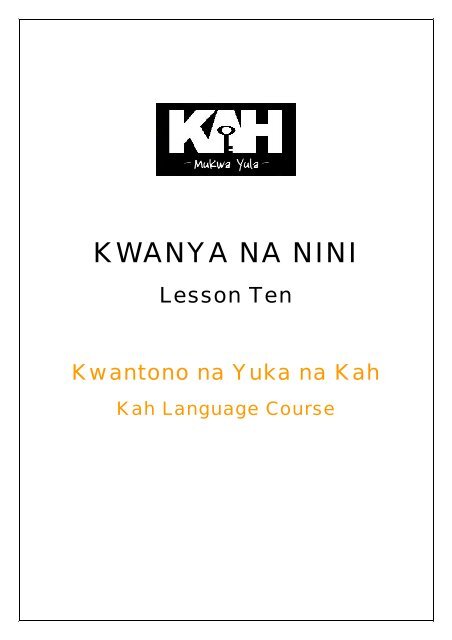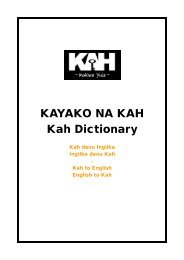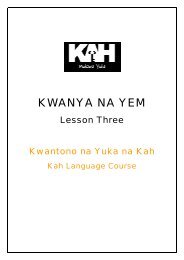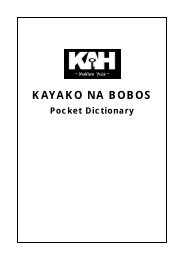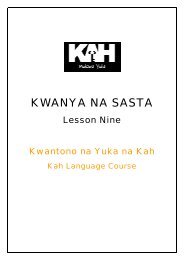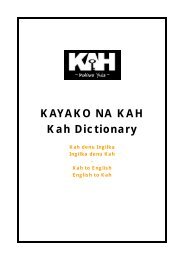You also want an ePaper? Increase the reach of your titles
YUMPU automatically turns print PDFs into web optimized ePapers that Google loves.
<strong>KWANYA</strong> <strong>NA</strong> <strong>NINI</strong><br />
Lesson Ten<br />
Kwantono na Yuka na <strong>Kah</strong><br />
<strong>Kah</strong> Language Course
Lesson 10<br />
Jamoyo bas - Wrapping things up<br />
This would be an excellent moment for a most awkward confession. Basicly, I lied<br />
about a dozen given translations. In all cases I fibbed about the English<br />
counterpart being a preposition. Take for example a sentence from lesson 7:<br />
Yunus: - Li gevu ge tunti wa.<br />
Yunus: - You run faster than I do.<br />
li gevu ge tunti wa<br />
YOU RUN FAST SURPASS I<br />
you run faster than me<br />
The word tunti, originally translated as "than", actually has a much better<br />
translation as the verb "to surpass":<br />
zeto tunti akuyun<br />
RESULT SURPASS EXPECTATION<br />
the result surpassed our expectations<br />
ijejeng na adensi tunti asaka yo<br />
STUPIDITY OF INCIDENT SURPASS DESCRIPTION ALL<br />
the stupidity of the incident surpassed all description<br />
A similar case is the word "until" (or so the translation was until now) as used in<br />
the snippets below from earlier texts in this course:<br />
wa lara lai maro kwa deche ata wa bochu tai<br />
I STAY THERE MONTH ONE UNTIL I HATCH THEN<br />
I stayed there for one month until the time I hatched<br />
naim nyom doya yo deche dingu<br />
RABBIT RUB FURNITURE ALL UNTIL SPARKLE<br />
the rabbit rubbed all furniture until it sparkled<br />
Deche actually is a verb, meaning "to meet":
om deche la kizado<br />
OPT MEET AT RESTAURANT<br />
let's meet in a restaurant<br />
deche janjashi<br />
MEET HABITUAL<br />
they met in the usual way<br />
nong kwiku deche bua<br />
NOT BEFORE MEET BROTHER<br />
I never met your brother before<br />
nunai deche alum na Yula<br />
TRAVEL MEET EDGE OF WORLD<br />
they traveled to the edge of the world<br />
The word le "to have" is another preposition-like word in <strong>Kah</strong> which is actually a<br />
verb. The meaning can be expanded somewhat to "with" or "having, holding" or in<br />
a more verbal sense "to have, hold" when you look at the construction used in the<br />
conversation in the previous paragraph:<br />
Ben: -Simbu le tiro vai lai.<br />
Ben: -The six year old boy over there.<br />
This sentence can also be translated as "the boy having six years". Also compare<br />
the following examples:<br />
varu le chempe gevu chu<br />
SOLDIER HOLD GUN RUN FROM<br />
the soldier holding the gun ran off<br />
bau sofi le pepe bo kiki<br />
DOG SWIM HOLD STICK IN MOUTH<br />
the dog swam holding the stick in his mouth<br />
reza en nuvu le seo na chai<br />
HARD THAT WALK HOLD CUP OF TEA<br />
it is hard to walk holding a cup of tea<br />
More examples of proper use of the word le are:
tatang reju uyu le duntu - never trust someone with fangs<br />
nenju sunda le pengo - I like the bike with the flag<br />
yudo le doti yam nenyun - the house with the red roof is pretty<br />
tumbenyo le mosa - a cheese sandwich, sandwich with cheese<br />
The antonym of le is leleng and behaves the same way. It can be translated<br />
either as "without" or "to be without", "to not have":<br />
wa leleng apa - I don't have any money<br />
bau leleng dun - a dog without teeth<br />
In fact, many words translated until now as prepositions work like this in <strong>Kah</strong>:<br />
bo - (to be) inside<br />
ti - (to be) above<br />
tila - (to be) on top of<br />
vu - (to be) below, under<br />
chu - (to come) from, to leave<br />
tos - (to be) regarding, to concern, regard, for, with, intended for, per<br />
And examples of their use are:<br />
buyu bo podo - the man is inside the store<br />
shum ti finso - the clouds are above the water<br />
kwenga tila titi - the spider is on top of my head<br />
yinga jovan yulo vu zonya - the monster is hiding underneath my bed<br />
shuki wau chu podo na Mohamed - this candy is from Mohamed's<br />
shop<br />
kaiko wau tos nyonoka - this book is about politics<br />
<strong>Kah</strong> does not have many words resembling English prepositions altogether. Most<br />
locative expressions contain the verb la "to be at":<br />
la Sumaro na sumpol sasta... - in February 2009...<br />
la kwando - at school<br />
la Irakan - in Iraq<br />
la penyo - in the woods
Another very important one is tos "about, to concern" but also "for, with". It is<br />
used in a whole variety of situations which are covered my multiple prepositions<br />
in English:<br />
kaiko wau tos haijono - this book is about biology<br />
wa kova yu tos aya - I emailed him considering the matter<br />
awau nong tos li - this doesn't concern you<br />
nong jo aya tos awau - I dont know anything about this<br />
ju mim wi tos aye - I feel real bad about it<br />
haya jam tos meo? - what are you doing with the cat?<br />
ben la nyiru tos fia - the kids were bickering over a toy<br />
adepo tos li - a delivery for you<br />
nong keju wehim tos aye - I won't hear of it<br />
Let's look at one of the example sentences above again:<br />
ben la nyiru tos fia<br />
CHILD BE AT BICKER CONCERN TOY<br />
the kids were bickering over a toy<br />
There are two verbs here, nyiru and tos, placed directly after one another,<br />
without conjunction. <strong>Kah</strong> allows a subject to take multiple verbs! This is known as<br />
a "serial verb construction" (SVC), in which multiple verbs are strung together.<br />
For example, each of the following three verbs can be used separately in<br />
combination with the same subject:<br />
wa nunai<br />
I TRAVEL<br />
I traveled<br />
wa de<br />
I COME<br />
I came<br />
wa ka<br />
I TALK<br />
I talked<br />
But they can also be strung together by merely placing them next to one another<br />
to form one sentence:
The example above uses the three verbs in a string: nunai, de and ka, all having<br />
the same subject! The translation of the sentence is:<br />
wa nunai de ka li<br />
I TRAVEL COME TALK TO YOU<br />
I traveled to come to talk to you<br />
Such verb strings in the following sentences are underlined:<br />
yunyo nuvu lutum podo<br />
THEY WALK PASS BY STORE<br />
they walked past the stores<br />
nong keju ka tos<br />
NOT WANT TALK ABOUT<br />
I don't want to talk about it<br />
simbu bon che titi<br />
BOY FALL HIT HEAD<br />
the boy fell hitting his head<br />
om nuchi paza remos<br />
OPT GO OUT BUY ICECREAM<br />
let's go out for some icecream
om baska jeto rejo yo<br />
OPT DECIDE CONSIDER FACT ALL<br />
let's decide considering all facts<br />
wanyo nubo fanai tunu Sibiran nunai Chosonan<br />
WE ENTER TRAIN CROSS SIBERIA TRAVEL NORTH KOREA<br />
we travelled across Siberia to North Korea by train<br />
This probably is the trickiest aspect about <strong>Kah</strong> for most people. Therefore, this<br />
entire lesson will be devoted to serial verb constructions. Every paragraph will be<br />
concluded with a short exercise in order to get acquainted with the matter first<br />
before moving on to the next level.<br />
10.1 Purpose<br />
Let's start off easy with a couple of examples from colloquial English doing the<br />
same thing:<br />
come see me<br />
let's go shopping<br />
<strong>Kah</strong> would put two verbs in the sentence in the exact same way:<br />
de weyun wa<br />
COME SEE ME<br />
come see me<br />
om denu pazanu<br />
OPT GO SHOP<br />
let's go shopping<br />
Sentences like these express purpose. One could add a conjugator "in order to"<br />
or "to" eno:<br />
de eno weyun wa<br />
COME PURP SEE ME<br />
come to see me<br />
om denu eno pazanu<br />
OPT GO PURP SHOP<br />
let's go shopping<br />
More examples of the use of two verbs with or without eno in order to express<br />
purpose are:
gevu lo (eno) hai<br />
RUN EMPH (PURP) LIVE<br />
run for your life!<br />
kava yu (eno) haka tos<br />
CALL HE (PURP) ASK CONCERN<br />
I called him to ask about it<br />
bau tomia (eno) muvan ule<br />
DOG DIE (ENO) SAVE OWNER<br />
the dog died saving its owner<br />
umomi pau yu miki (eno) momi<br />
DOCTOR GIVE 3SG MEDICINE (PURP) CURE<br />
the doctor gave him medicine to cure him<br />
kwaibo ponya (eno) zapau aboko<br />
CLICK BUTTON (PURP) SUBMIT SUBSCRIPTION<br />
click the button to submit your subscription<br />
soi zapau kovaka (eno) wanyo tengi kava<br />
PLEASE SUBMIT GIVE EMAIL-ADDRESS (PURP) WE CAN CALL<br />
please submit your email so we can get in touch<br />
Examples using this construction can be found in the letter below:
owenju - respected, dear... (used in formal letters)<br />
munjo - to inform<br />
tara - to wait, wait for<br />
nenila - airport<br />
kova - to email<br />
Peching - Beijing<br />
jeto - to consider, think about as an option<br />
wanki - supper<br />
kava - to call, make a phonecall to<br />
Ital - Italian<br />
kubora - to reserve, make reservations
nunya - table<br />
wenjule - respectfully, sincerely yours (used in formal letters)<br />
Now please make the following exercise, combining the pictures in order to make<br />
a sentence expressing purpose:<br />
(eno)<br />
(PURP)<br />
(to)<br />
chevu roya<br />
KICK BALL<br />
to kick a ball<br />
fon<br />
TO PUNISH<br />
to punish it<br />
(eno)<br />
(PURP)<br />
(to)<br />
jala kaizaya<br />
PLACE TRAP<br />
to place a trap<br />
yun tanu<br />
WATCH MOVIE<br />
to watch a movie<br />
(eno)
(eno)<br />
(PURP)<br />
(to)<br />
seseche ben<br />
SPANK CHILD<br />
to spank a child<br />
hiza kil<br />
CATCH MOUSE<br />
to catch a mouse<br />
(eno)<br />
(PURP)<br />
(to)<br />
jari yunum<br />
TURN ON TV<br />
to turn on the tv<br />
lara sham<br />
STAY WARM<br />
to keep warm<br />
(eno)<br />
(PURP)<br />
(to)<br />
jango mengo gai<br />
DRESS SWEATER THICK<br />
to put on a thick sweater<br />
jafio<br />
SCORE<br />
to score
10.2 Tunti tio<br />
The verb translated as "than" tunti is used in comparative constructions:<br />
mul wan tunti ume<br />
COW BE BIG SURPASS SHEEP<br />
cows are bigger than sheep<br />
anin wan tunti tira yo<br />
SUN BE BIG SURPASS PLANET ALL<br />
the sun is bigger than all planets<br />
chempe tenza tunti shuki (eno) munchu uyu la gevu<br />
GUN USEFUL PURPASS CANDY (TO) CHASE OFF PERON BE AT RUN<br />
guns are more useful than candy to send people running<br />
wa le apa wi tunti li<br />
I HAVE MONEY MUCH SURPASS YOU<br />
I have more money than you<br />
And superlatives are formed by using the verb tio "to be above all":<br />
Chomolumah wen tio<br />
MT EVEREST HIGH ABOVE ALL<br />
Mount Everest is the highest<br />
uma jo nen tio<br />
MOTHER KNOW GOOD ABOVE ALL<br />
mother knows best<br />
huyu nenje tio, win eom milkos?<br />
WHO SMART ABOVE ALL, HORSE OR DOORKNOB<br />
who's smarter, a horse or a doorknob?<br />
The following cartoon shows ample use of both verbs:
Unga tenza tio
aska - to decide<br />
zauza - to irritate<br />
janjesko - to confuse<br />
mwevu - to stroll, wander<br />
haka - to ask<br />
sencho - to give birth to, to lay<br />
geta - instantly, imminent<br />
mindi - vermin, bugs<br />
jekil - rat<br />
unai - snake<br />
yunga - human<br />
shushoi - to pet, stroke<br />
cheze - right away, directly after<br />
nyeki - to smile<br />
numia - to hunt<br />
cheta - sudden, suddenly<br />
jebas - to conclude<br />
2) Answer the following questions regarding the cartoon above:<br />
a) Hayu unga nen tio?<br />
b) Haya kwo janja bencho?<br />
c) Reo hiwi kwenga tengi bencho tos tato?<br />
Please translate the following sentences to <strong>Kah</strong>:<br />
d) Mike is bigger than me.<br />
e) I am smarter than a horse.<br />
f) Horses are smarter than doorknobs.<br />
g) I have more candy than you.<br />
h) I have more horses than you.<br />
i) Horses are bigger than cats.<br />
j) My horse is the biggest.<br />
k) My horse is the blackest.
Please translate the following sentences to English:<br />
l) Nini wi tunti jom.<br />
m) Kaiko wau wan tunti aye.<br />
n) Kwenga tengi bencho reo wi tio.<br />
o) Nong keju li wan tunti wa ha?<br />
p) Nenju meo wi tunti bau.<br />
q) Nenju win si tio.<br />
Look carefully at the pictures below and answer the following<br />
questions in <strong>Kah</strong>:<br />
r) Roya hana wan tio?<br />
s) Roya jim sin tio ha?<br />
t) Haya dau na roya saska?<br />
u) Ajim wan tunti ayam ha?<br />
Observe the picture below and answer the questions in <strong>Kah</strong>:
v) Tira hana wan tio?<br />
w) Tira hana jesa en nenyun tio?<br />
x) Nin tira mau ha?<br />
y) Soi sendau tira jom yanyo sin tio.<br />
z) Ka tira hana le rongu.
10.3 Fanai denu Rioh<br />
A word like denu "to go" can be used like both a preposition and a verb in <strong>Kah</strong>.<br />
Compare:<br />
denu vado!<br />
GO HOME<br />
go home!<br />
bau vuvunyau denu vado<br />
DOG LIMP GO HOME<br />
the dog limped towards our home<br />
wanyo la denu Rioh<br />
WE BE AT GO RIO<br />
we are going to Rio<br />
wanyo nubo fanai denu Rioh<br />
WE ENTER TRAIN GO RIO<br />
we took the train to Rio<br />
The word chu also expresses a motion from a certain point:<br />
uma kwi chu chipola<br />
MOTHER ALREADY FROM MARKET<br />
mother came from the market<br />
chu <strong>Kah</strong> denu Ingilka<br />
FROM KAH GO ENGLISH<br />
from <strong>Kah</strong> to English<br />
kovako chu bua<br />
EMAIL FROM BROTHER<br />
an email from my brother<br />
kovako nong chu mea<br />
EMAIL NOT FROM SISTER<br />
the email was not from my sister<br />
A very common type of verb strings consist of two verbs, one describing the<br />
action by which the means of transportation is entered or mounted, and a second<br />
one expressing the direction involved. A frequently used verb occurring such<br />
constructions is nubo "to enter". Take for example the sentence we encountered<br />
earlier in this paragraph:
wanyo nubo fanai denu Rioh<br />
WE ENTER TRAIN GO RIO<br />
we took the train to Rio<br />
nubo anenu denu Peching<br />
ENTER FLIGHT GO BEIJING<br />
to take a flight to Beijing<br />
nubo nia deza aki<br />
ENTER CAR BRING FOOD<br />
to get some food by car<br />
nubo fanai denu lai<br />
ENTER TRAIN GO THERE<br />
they went there by train<br />
And a comparable one is nuti "to mount":<br />
nuti win gevu dola<br />
MOUNT HORSE RUN CITY<br />
they took a horse (running) to the city<br />
nuti sunda muno vado<br />
MOUNT BIKE DRIVE HOME<br />
to ride home by bike<br />
nuti sunda tunu sindola<br />
MOUNT BIKE CROSS VILLAGE<br />
to ride across town on a bike<br />
Likewise, combining a verb like muno "to drive, ride" with a verb expressing<br />
direction or location results in constructions as:<br />
muno uyu denu bandola<br />
DRIVE PERSON GO TOWN<br />
to drive someone to town<br />
al nong tengi muno nia deche sindola<br />
IMP NOT CAN DRIVE CAR REACH VILLAGE<br />
the village cannot be reached by car<br />
Now please make the following exercise:
3) Translate the following to <strong>Kah</strong>:<br />
a) They rode their bikes to the library.<br />
b) They rode their horses to the library.<br />
c) They rode their horses to town.<br />
d) The library cannot be reached by horse.<br />
e) The boy ran across the street.<br />
f) The boy rode across the street on his bike.<br />
g) They took a plane to Acapulco.<br />
h) They took the train to Acapulco.<br />
i) We took a flight to the market.<br />
Translate the following sentences into English<br />
j) Uma muno ben denu kaikodo.<br />
k) Ben nuti sunda muno kaikodo.<br />
l) Om nubo naini denu kizado.<br />
m) Umukwan nubo nia nuchi sindola.<br />
n) Keju denu muno ha?.<br />
o) Bau tengi nuti sunda denu vado ha?.<br />
p) Haya linyo janja muno denu Akapulkoh?<br />
q) Keju nuti sunda muno ha?<br />
r) Win nong janja tengi nubo fanai denu vado.<br />
Read the following letter and answer the questions:
s) Hayu janko nuko?<br />
t) Tos hayu be janko nuko?<br />
u) Haya nubo denu Tokioh?<br />
v) Nunai chu hala deche hala?w) Kwiku nunai Seol mau ha?<br />
x) Haya nen tio la Tokioh?
10.4 Yun kwesho kwan <strong>Kah</strong><br />
Another very important verb occurring in these strings is za "to take" or "to use".<br />
Please note how it is used as the first verb in the construction below:<br />
za koya janko nuko<br />
TAKE PEN WRITE LETTER<br />
to write a letter with a pen<br />
za tuya tu seki<br />
TAKE KNIFE CUT MEAT<br />
to cut meat with a knife<br />
za duzu jando wendo<br />
TAKE BRICK BUILD TOWER<br />
to build a tower with bricks<br />
za api jaru api<br />
TAKE FIRE FIGHT FIRE<br />
fight fire with fire<br />
The part that is translated in English with "with" is expressed by the verb za and it<br />
is placed in front of the actual action, which is the opposite of the English<br />
situation, where the phrase denoting the instrumental value is placed after the<br />
verb:<br />
za koya janko nuko<br />
za tuya tu seki<br />
za duzu jando wendo<br />
vs.<br />
to write a letter with a pen<br />
to cut meat with a knife<br />
to build a tower with bricks<br />
But za is not the only verb acting in such an instrumental manner<br />
wa yun kwesho kwan <strong>Kah</strong><br />
I LOOK WEBSITE LEARN KAH<br />
I learned <strong>Kah</strong> from a website<br />
nenti nong jango vuzepe ye gevu<br />
BETTER NOT DRESS HEELS THAT RUN<br />
you better not run with those heels
al nong tengi yun kochi jesa kaiko<br />
IMP NOT CAN LOOK COVER JUDGE BOOK<br />
you can't judge a book by it's cover<br />
him Led Zeppelin sisi kwan Ingilka<br />
LISTEN LED ZEPPELIN JUST LEARN ENGLISH<br />
he learned English by merely listening to Led Zeppelin<br />
4) Please translate the following sentences to <strong>Kah</strong>:<br />
a) Please do not write with pencil.<br />
b) I can beat you up with one finger.<br />
c) You can't pay with Euros here.<br />
d) To build a tower with trees.<br />
e) To build a tower with eggs.<br />
f) They killed the horse with a gun.<br />
g) One can't eat soup with a fork.<br />
h) The soldier chased the dog holding the stick in his mouth with a gun.<br />
i) You better not run with a knife.<br />
j) Maybe we ought to stirfry it in oil.<br />
Please translate the following sentences to English:<br />
k) Varu za pepe cheche bau.<br />
l) Varu za chempe cheche bau.<br />
m) Varu za tuya tutu bau.<br />
n) Uba nubo nia mimia kwenga.<br />
o) Tinti za koya janko nuko yu.<br />
p) Hamun nong za pepe jando wendo?<br />
q) Al janja za tuya tu aya.<br />
r) Soi za Dolar papau.<br />
s) Al nong janja za tuya janko nuko.<br />
t) Yunga wi yun yunum kwan Ingilka.
10.5 Li kwan <strong>Kah</strong> bas!<br />
Combining verbs is also very useful in order to express a resultative state of<br />
something. In this matter, the second verb used tends to denote something with a<br />
finitive meaning. A very common verb in these constructions is bas "to end,<br />
finish".<br />
jamoyo aya bas<br />
PREPARE THING END<br />
to wrap something up<br />
jampi sindola bas<br />
BURN VILLAGE FINISH<br />
to burn a village to the ground<br />
nong tengi pai li bas!<br />
NOT CAN THANK YOU FINISH!<br />
I can't thank you enough!<br />
Other verbs involved are:<br />
al cheche simbu mimia<br />
THEY BEAT BOY KILL<br />
the boy was beaten to death<br />
tinki tomia<br />
STARVE DIE<br />
to starve to death<br />
bunche doki kai<br />
SLAM DOOR SHUT<br />
to slam the door shut<br />
gegeze zim munchu vado<br />
CHASE FLY EXPEL HOME<br />
to chase a fly out of the house<br />
mune kihu sisimbe<br />
THROW PLATE SCATTER<br />
to throw a plate to pieces<br />
fum pisau mompi<br />
BLOW CANDLE EXTINGUISH<br />
to blow out a candle
Another finitive serial verb construction is the sentence describing the level to<br />
which you have mastered <strong>Kah</strong> at this point:<br />
li kwan <strong>Kah</strong> bas!<br />
YOU STUDY KAH END<br />
you're done studying <strong>Kah</strong>!<br />
Therefore I promise this is the last exercise from this course:<br />
5) Please translate the following sentences to <strong>Kah</strong>:<br />
a) I ate it all up.<br />
b) I'm done looking at it.<br />
c) Finish building the tower!<br />
d) Can one truly be done learning a language?<br />
e) Maybe you ought to finish the tower with bricks.<br />
f) The boys beat the bricks to pieces.<br />
g) The boys kicked the tower to pieces.<br />
h) You won't starve to death if you don't eat candy for a day.<br />
i) They threw the soldier off the tower to his death.<br />
j) How I'd like to shoot that parrot dead.<br />
k) His parents kicked him out when he was 16.<br />
l) He drove the car out of the train station.<br />
m) He kicked the cardoor shut.<br />
Please translate the following sentences to English:<br />
n) Al soza binso yo bas.<br />
o) Toto al nong kiza, ke tinki tomia.<br />
p) Tengi janko nuko bas nintau ha?<br />
q) Papau buyu bas lo!<br />
r) Nong tus kiza ayo bas.<br />
s) Chen yu mimia!<br />
t) Simbu mune seo bai.<br />
u) Haya za cheche yu mimia?<br />
v) Al nong cheche uyu za koya.<br />
w) Champe sol tunti koya.<br />
x) Hata bau jandun meo mimia?<br />
y) Nong jo ata bau jandun meo mimia tai.<br />
z) Nong jo amun bau jandun meo mimia chumunye.
Tau jere li tengi koyun auko na vu gejole :<br />
Muhim lilo!<br />
Soi tombe kwalanyo na <strong>Kah</strong> noza ashika na vu:<br />
1) Kwaibo nova wau.<br />
2) Kwaibo nova ya ka "Register" boko:
3) Kwaibo ponya na ti:<br />
4) Janko senka lau:
5) Janko kovaka lau tato sun:
6) Janko deshoka lau tato sun:
7) Suntoko sistan la josho:
8) Kwaibo ponya "Submit" eno zapau aboko:<br />
9) Mai nende la kwalanyo na <strong>Kah</strong>!<br />
Pai li ho en kwan <strong>Kah</strong>!<br />
Nova tenza:<br />
Kayako wan - Great dictionary<br />
Lexicon - Kayanyo<br />
Karen na noke - Reference grammar
Answers<br />
1)<br />
Jala kaizaya (eno) hiza kil<br />
Chevu roya (eno) jafio<br />
Seseche ben (eno) fon<br />
Jari yunum (eno) yun tanu<br />
Jango mengo gai (eno) lara sham<br />
jala kaizaya<br />
PLACE TRAP<br />
to place a trap<br />
(eno)<br />
(TO)<br />
(to)<br />
hiza kil<br />
CATCH MOUSE<br />
to catch a mouse<br />
chevu roya<br />
KICK BALL<br />
to kick a ball<br />
(eno)<br />
(TO)<br />
(to)<br />
jafio<br />
SCORE<br />
to score
seseche ben<br />
SPANK CHILD<br />
to spank a child<br />
(eno)<br />
(TO)<br />
(to)<br />
fon<br />
TO PUNISH<br />
to punish it<br />
jari yunum<br />
TURN ON TV<br />
to turn on the tv<br />
(eno)<br />
(TO)<br />
(to)<br />
yun tanu<br />
WATCH MOVIE<br />
to watch a movie<br />
jango mengo gai<br />
DRESS SWEATER THICK<br />
to put on a thick sweater<br />
(eno)<br />
(TO)<br />
(to)<br />
lara sham<br />
STAY WARM<br />
to keep warm<br />
2) Answer the following questions regarding the cartoon above:<br />
a) Kwenga unga nen tio.<br />
b) Kwo janja bencho reo.<br />
c) Tengi bencho reo pol tos tato.
Please translate the following sentences to <strong>Kah</strong>:<br />
d) Mike wan tunti wa.<br />
e) Wa nenje tunti win.<br />
f) Win nenje tunti milkos.<br />
g) Wa le shuki wi tunti li.<br />
h) Wa le win wi tunti li.<br />
i) Win wan tunti meo.<br />
j) Win na wa wan tio.<br />
k) Win na wa sol tio.<br />
Please translate the following sentences to English:<br />
l) Ten is more than five.<br />
m) This book is bigger than that one.<br />
n) A spider can lay the most eggs of all.<br />
o) Don't you want to be bigger than me?<br />
p) I like cats better than dogs.<br />
q) I like horses least of all.<br />
Look carefully at the pictures below and answer the following questions in<br />
<strong>Kah</strong>:<br />
r) Roya saska wan tio.<br />
s) Nong, roya jim nong roya sin tio.<br />
t) Dau na roya saska ya yem.<br />
u) Eo, ajim wan tunti ayam.<br />
Observe the picture below and answer the questions in <strong>Kah</strong>:<br />
v) Yanyun tira wan tio.<br />
w) Jesa en ... nenyun tio,<br />
x) Nong, Nin nong tira, ya mangu.<br />
y) Tira jom yanyo sin tio Bunchala, Shunku, Yula, Yamadu ai Vendu.<br />
z) Aurora tira le rongu.<br />
3) Translate the following to <strong>Kah</strong>:<br />
a) Nuti sunda denu kaikodo.<br />
b) Nuti win denu kaikodo.<br />
c) Nuti win denu bandola.<br />
d) Al nong tengo nuti win deche kaikodo.<br />
e) Simbu gevu tunu nuno.<br />
f) Simbu nuti sunda tunu nuno.<br />
g) (Yunyo) nubo neni denu Akapulkoh.<br />
h) (Yunyo) nubo fanai denu Akapulkoh.<br />
i) (Wanyo) nubo anenu denu chipola.
Translate the following sentences to English<br />
j) The mother drove her kid to the library.<br />
k) The child rode his bike to the library.<br />
l) Let's take the bus to the restaurant.<br />
m) The teacher went to the village by car.<br />
n) Do you want to go for a drive?<br />
o) Can a dog ride home by bike?<br />
p) How do you usually go to Acapulco?<br />
q) Do you want to go by bike?<br />
r) Horses do not usually go home by train.<br />
Read the following letter and answer the questions:<br />
s) Nikitah janko nuko.<br />
t) Janko nuko tos uma.<br />
u) Nubo neni denu Tokioh.<br />
v) Nunai chu Maskavah denu Tokioh.<br />
w) Eo, mau nunai Seol.<br />
x) Aki, titom eom Utokioh? Utokoih nen tio.<br />
4) Please translate the following sentences to <strong>Kah</strong>:<br />
a) Soi nong za champe janko.<br />
b) Tengi za yol kwa cheche li can beat you up with one finger.<br />
c) Nong tengi za Eroh papau lau.<br />
d) Za ape jando wendo.<br />
e) Za reo jando wendo.<br />
f) Za chempe jamia win.<br />
g) Al nong tengi za kipyu kiza runso.<br />
h) Varu za chempe geze bau le pepe bo kiki.<br />
i) Nenti nong gevu le tuya.<br />
j) Tente tinti za sau gezu.<br />
Please translate the following sentences to English:<br />
k) The soldier beat the dog up with a stick.<br />
l) The soldier beat the dog up with a gun.<br />
m) The soldier chopped the dog up with a knife.<br />
n) Father killed the spider with a car.<br />
o) You should write him a letter with a pen.<br />
p) Why don't you build a tower with sticks?<br />
q) Things are usually cut with a knife.<br />
r) Please pay in Dollars.<br />
s) One usually doesn't write a letter with a knife.<br />
t) Many people learn English from tv.
5) Please translate the following sentences to <strong>Kah</strong>:<br />
a) Kiza ayo bas.<br />
b) Yun ya bas.<br />
c) Jando wendo bas!<br />
d) Al ho tengi kwan yuka bas ha?<br />
e) Tente tinti za duzu jando wendo bas.<br />
f) Simbu cheche duzu sisimbe.<br />
g) Simbu chevu wendo sisimbe.<br />
h) Nong denu tinki tomia toto nong kiza shuki tos anin kwa.<br />
i) Mune varu chu wendo mimia.<br />
j) Wu ke chen sankane mimia.<br />
k) Fanyo chevu yu munchu eta le tiro nini vai.<br />
l) Muno nia chu fanaila.<br />
m) Chevu doki na nia kai.<br />
Please translate the following sentences to English:<br />
n) All beer has been finished.<br />
o) If one doesn't eat, he will starve to death.<br />
p) Can you finish the letter today?<br />
q) Pay the man off!<br />
r) You may not eat everything up!<br />
s) Shoot him to death!<br />
t) The boy threw the cup breaking it.<br />
u) What did they beat him to death with?<br />
v) One usually doesn't beat someone up with a pen.<br />
w) The pencil is darker than the pen.<br />
x) When did the dog bite the cat to death?<br />
y) I don't know when the dog bit the cat to death.<br />
z) I don't know why the dog bit the cat to death.


